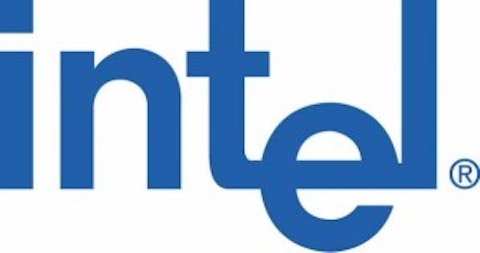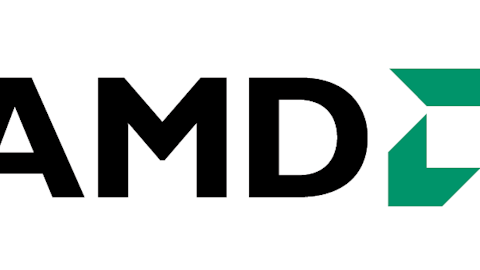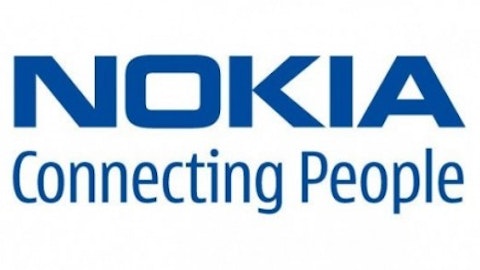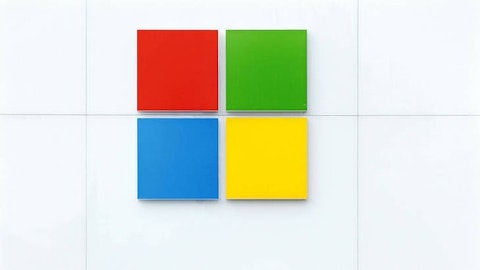
Intel Corporation (NASDAQ:INTC)’s new approach may hurt its margins. Mobile devices typically sell at lower price points than desktops, making it harder for their component suppliers to eke out profits. Also, there is more competition in the mobile chip market than in desktops, where Intel Corporation (NASDAQ:INTC) shares a duopoly with AMD. In mobile, there are multiple ARM based competitors in the market.
In the company’s earnings call (as transcribed at Seeking Alpha), Krzanich stated:
“These changes will drive a greater emphasis on Atom-based products bringing the full weight of our process and architectural leadership to the Atom family. We will move Atom even faster to our leading-edge silicon technology and focus on the SOC integration of key components like graphics, communications and other devices.”
Intel Corporation (NASDAQ:INTC) needs to focus more on mobile, because traditional PCs are not selling well. The potential to hurt margins with this strategy is a necessary risk.
According to IDC, PC shipments fell 11.4% year over year in the second quarter. Even Lenovo, which had been bucking the trend to pass Hewlett-Packard Company (NYSE:HPQ) for the PC market’s top spot, experienced a decline in PC shipments of 1.4%. Traditional PC giants HP and Dell Inc. (NASDAQ:DELL) continued their struggles, experiencing declines in shipments of 7.7% and 4.2% year over year, respectively. However, the numbers from the two are much improved from the previous quarter when HP and Dell Inc. (NASDAQ:DELL) experienced declines in shipments of 23.7% and 10.9% year over year, respectively.
In comparison, tablet shipments grew a monster 142.4% year over year, and smartphone shipments grew 41.6% year over year in Q1. Furthermore, Microsoft Corporation (NASDAQ:MSFT) Windows 8 is still just sitting at a little above 5% in desktop market share in July, according to Net Market Share. Looking at the market trends, it is clear that Intel Corporation (NASDAQ:INTC) needs to succeed in mobile.
Haswell cannibalized?
Intel Corporation (NASDAQ:INTC) plans to launch Silvermont, its next generation architecture for Atom, in the second half of 2013. According to Intel, Bay Trail, an upcoming system-on-a-chip with Silvermont cores, will bring tablets that cost less than $150 to the market. However, there is some concern that Bay Trail might cannibalize Haswell, Intel’s new architecture for its Core processors. There will be some overlap because Bay Trail will also power desktops and Haswell is also aimed at tablets.
While there is a possibility that margins may suffer, it’s better for Intel to take that hit than let the competition take over the market. It seems Krzanich has a similar opinion. When asked about the potential cannibalistic effect of Bay Trail during the earnings call, he stated, “At the end of the day, the market will go where the market goes, and better to have a product like Bay Trail that we can play no matter where it goes rather than miss that market.”
Also, according to Intel Corporation (NASDAQ:INTC), Bay Trail will have better margin dollars than previous Celeron models, and its upper price range will be priced like Celeron, so the risk of hurting margins and Haswell is somewhat minimized. Additionally, Intel’s Core processors are superior to Intel’s earlier Atom chips, which helps protect the higher prices Core processors command.
Some second-half mobile opportunities
The margin risk that Intel is taking has created some opportunities in mobile computing in the second half. Hewlett-Packard Company (NYSE:HPQ) announced a fanless tablet with Haswell for later this year. Fans take up space and battery life, so a fanless design, along with the processing power of a Core chip, is a very compelling product for tablets.
Also, Bay Trail will bring x86 tablets that cost less than $150 to the market. This, along with Microsoft Corporation (NASDAQ:MSFT)’s update of Windows 8.1, present some intriguing mobile opportunities for Intel and the traditional PC market. Overall, the margin risk Intel Corporation (NASDAQ:INTC) is taking with its mobile strategy is necessary.
The article Despite Margin Risks, Intel’s Mobile Plan Is Necessary originally appeared on Fool.com and is written by Alvin Gonzales.
Alvin Gonzales owns shares of Microsoft and Intel. The Motley Fool recommends Intel. The Motley Fool owns shares of Intel and Microsoft. Alvin is a member of The Motley Fool Blog Network — entries represent the personal opinion of the blogger and are not formally edited.
Copyright © 1995 – 2013 The Motley Fool, LLC. All rights reserved. The Motley Fool has a disclosure policy.





